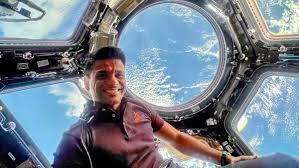Axiom-4 mission ISS: Today’s India fearless and confident, says Shubhanshu Shukla in farewell speech from ISS

In a moment brimming with national pride and global admiration, Group Captain Shubhanshu “Shux” Shukla delivered an emotional farewell address aboard the International Space Station (ISS) on July 14, 2025, as the Axiom-4 mission prepared for its return journey to Earth. With powerful words and a stirring message, Shukla reminded the world that modern India is no longer a quiet observer in space exploration—but a fearless and confident participant in humanity’s grandest endeavor.
A Historic Mission for India
Launched on June 25, 2025, from Kennedy Space Center in Florida, the Axiom-4 mission made history by sending the first Indian astronaut to the ISS. Shukla, an Indian Air Force Group Captain, represented not just the Indian Space Research Organisation (ISRO), but also a rising nation eager to expand its role in international space research. The mission was the result of collaboration between Axiom Space, SpaceX, NASA, and ISRO, highlighting the growing importance of global partnerships in modern space missions.
During their 18-day stay aboard the ISS, the Axiom-4 crew conducted over 60 science experiments, including several designed and led by Indian scientists. These experiments ranged from microgravity studies to biomedical research, helping to build the foundation for India’s future missions, including the highly anticipated Gaganyaan crewed flight and the proposed Indian space station.
“Aaj Ka Bharat” – A Message of Strength and Vision
As the mission drew to a close, Shukla addressed Earth in both English and Hindi, offering a message that resonated with emotion, science, and symbolism. Referencing Rakesh Sharma’s iconic phrase from 1984, when India’s first astronaut viewed Earth from space and said, “Saare Jahan Se Accha,” Shukla remarked:
“Today’s India looks ambitious, fearless, confident, full of pride. India still looks ‘saare jahan se accha’ from space.”
This modern echo of Sharma’s words serves as a bridge between past and future—acknowledging India’s pioneering space journey while setting a tone of confidence for the coming decades.
Shukla emphasized that the mission was not just a personal or national achievement but a collective triumph of human potential when united under a common goal. He extended his gratitude to ISRO, Axiom Space, NASA, SpaceX, international researchers, Indian students, and the ISS crew for enabling this remarkable journey.
“It’s a testament to what humanity can achieve when we work with a shared purpose,” he said.
Experiments that Matter
What sets Axiom-4 apart from previous missions was the inclusion of Indian-led scientific experiments. These focused on understanding the effects of spaceflight on human health, biological systems, and mechanical instruments, all vital data points for ISRO’s long-term ambitions.
Among the experiments were:
- Biomedical Studies: Research on muscle atrophy, cardiovascular health, and blood plasma changes in microgravity.
- Material Science: Testing of Indian-developed alloys and components that could be used in future space hardware.
- Plant Growth: Analysis of plant germination and growth in zero-gravity conditions, potentially paving the way for sustainable food systems on future long-duration missions.
These experiments not only demonstrate India’s expanding research capabilities but also symbolize its readiness to be a serious contributor to space-based innovation.
A View of Earth—and of Humanity
Shukla’s farewell speech also offered a poetic and philosophical glimpse of Earth from above. He described the view as “magical,” expressing awe at the beauty of the planet and the fragility of its ecosystems.
“Looking at Earth from this vantage point, you understand how small yet significant we are. Every border vanishes, every division dissolves. We are one species on one planet.”
His words served as a gentle but firm reminder of the unity that space exploration can foster, even in times when geopolitical tensions dominate headlines.
Inspiring the Next Generation
In Hindi, Shukla ended his speech with a powerful message to the people of India:
“Aapki aur meri yatra abhi bahut lambi hai.”
(Your and my journey is still long.)
It was a call to action for young minds, aspiring scientists, engineers, and space dreamers across India. His message was clear: this mission is not an end—it is a beginning.
The Road Back and the Road Ahead
The Axiom-4 capsule is scheduled to undock from the ISS late on July 14 and return to Earth with a splashdown off the coast of California on July 15. After landing, Shukla and his fellow astronauts will undergo a rehabilitation program to readjust to gravity after spending nearly three weeks in space.
Looking ahead, India’s space ambitions are soaring. With Gaganyaan slated for a possible crewed launch in 2026 and ongoing work on an independent space station by 2030, the momentum is real. ISRO is also expanding international collaborations, including partnerships with the European Space Agency (ESA) and NASA.
The success of Axiom-4 serves as a key stepping stone, not just technically, but symbolically. It reinforces India’s position as a capable, collaborative, and confident spacefaring nation.
Conclusion: A Nation Rising Beyond the Sky
Group Captain Shubhanshu Shukla’s farewell speech from the ISS was more than a farewell—it was a declaration. A declaration that India is not just looking up at the stars but is now among them, with a vision grounded in science, courage, and unity.
In those final moments above the Earth, Shukla didn’t just speak for himself. He spoke for a billion dreams that now know: space is not beyond reach. It is India’s next frontier.






